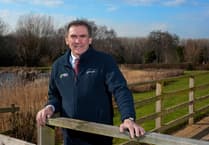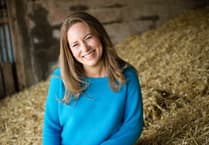ANDREW couldn’t phone in sick. Despite his temperature, weak and trembling legs, nausea, dizziness and aches - classic symptoms of the ’flu raging through him, he couldn’t do what most of us would do, switch off the alarm, sink gratefully into the warmth of bed and wait for the storm to pass.
Dressing and going downstairs, shivering and shaking with each step, he pulled on a heavy coat still damp from the previous evening and, pausing only to down a couple of paracetamol in a glass of water, opened the back door and stepped out into the pre-dawn murk and sleet where livestock, oblivious to his suffering, cried out for his attention.
Three months later, with the ’flu gone and spring in the Monmouthshire air, things should have been much better. But one morning, while wheeling a barrow across the yard - a task so routine it was done on auto-pilot - the sky fell in on Andrew’s world and his life came crashing down.
’It suddenly felt as if someone had strapped a heavy weight to me. I stopped and for some reason I felt like crying. I tried to walk on but after a few paces it was as if the ground had turned to sponge. I can’t remember going back into the house but the next thing I knew I was sitting at the kitchen table. My wife had made me a cup of tea and was asking me a stream of questions, but all I wanted to do was stare out of the window.’
They don’t call it a ’Nervous breakdown’ any more. Nervous breakdown isn’t an actual medical term or a mental illness, but was once a commonly-used label for those overwhelmed by anxiety, depression or both.
In Andrew’s case, it took several weeks of combined medication and counselling to finally bring him out of the dark tunnel he had drifted down and back into the light where he could once again see a point in what filled his days.
Now, with tools learned through cognitive behaviour therapy, changes to his routine and a realisation that it is perfectly fine to ask for help, he is equipped to face the daily challenges of the life he was born into.
Andrew’s problem is not an isolated one. Speaking at this year’s Royal Welsh Show, Farmers Union of Wales president, Glyn Roberts said, ’One in four people will suffer with mental health problems in their lifetime, and sadly, agriculture carries the highest rate of suicide of any occupation. Concerns about the unpredictable weather, animal disease, support payments and the impact of Brexit are weighing on the minds of many farmers throughout Wales.
Mind Monmouthshire, a local charity autonomous from the national body, is staffed by people who live in the area and who ensure all funds raised are spent in the county.
This week, they launched their dedicated Farmers’ Project at Monmouthshire Livestock Market where project leader, Jaime Devine highlighted some of the reasons why those in the agricultural community are all too often falling through the safety net.
He stated, ’Farmers face excessive workloads, frequently working ifar longer than the accepted full-time norm of 37 hours per week. Holidays can be a rarity and as for sick pay? No such thing. Who has time to attend a GP appointment when there is lambing to be done, or milking to complete?
’The isolation that many farmers, and their families feel is another important issue. Spending extended periods of time alone can force a dip in a person’s mental health, yet for many who work in a rural setting, this is a forced hazard of the lifestyle.’
Lorraine O’Neill’s sheep graze on land which straddles the border of Monmouthshire and Blaenau Gwent. Partner, Pat works in London and comes home only on weekends and so from Monday to late Friday, Lorraine rarely sees another friendly face.
’People think it’s idyllic and Pat’s friends in London never tire of telling him how lucky he is to be having somewhere as amazing as this to call home, but the only way we can survive in the present climate is for him to earn the extra by working away.’
Lorraine drives 35 minutes to take her daughter, Molly, 7, to school each morning and the same to collect her, but the demands of the job mean there is little time to stop and chat to other parents.
’I speak to friends online and share pictures and our news but when Molly is off school I see no one from one weekend to the next, we are so far out here and the road is pretty bad. If you haven’t got a 4x4 you will struggle.’
’It’s not fair on Molly either so she often goes to stay with her auntie, uncle and cousins town, which means I have no one but the sheep. I know it is taking its toll, I feel permanently tired and stressed. nobody has been listening. The countryside is crying.’
Farmers and farming families are known for their resilience; however, the reluctance to seek help is something that concerns organisations such as Mind Monmouthshire. Jaime says, ’Mind Monmouthshire exists in a county which is predominantly rural, yet the farming population are not accessing our services.
Research shows that traditional sources of help are not easy for those in the farming community to access.’
FUW’s Glyn Roberts said, ’Coupled with the loneliness and isolation that comes with farming means that farmers and agricultural workers are highly susceptible to poor mental wellbeing.
’Failing to deal with that could lead to all sorts of issues, such as the farm running inefficiently, a serious injury, relationship breakdowns, poor physical health and, even worse, it could lead to suicide.’
Mind Monmouthshire’s Jaime added, ’We aim to create an independent, safe environment where farmers and their families can discuss their concerns around their own emotions and practical issues. This will be a totally confidential service and anything told to the support worker would be listened to without judgement. The details of what we can offer are all on the Mind Monmouthshire website or by calling 01873 858275.’




